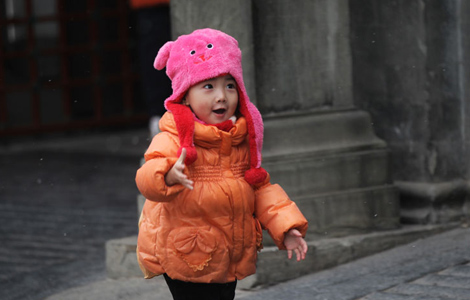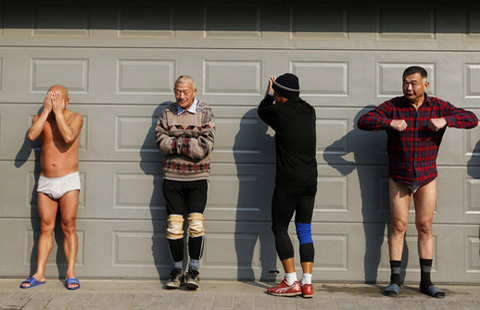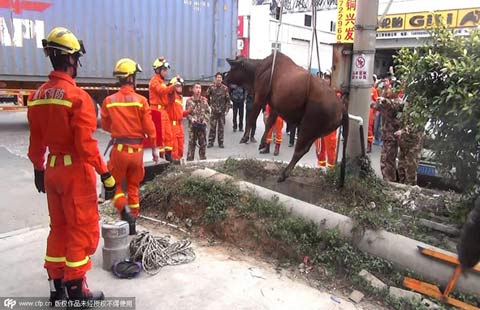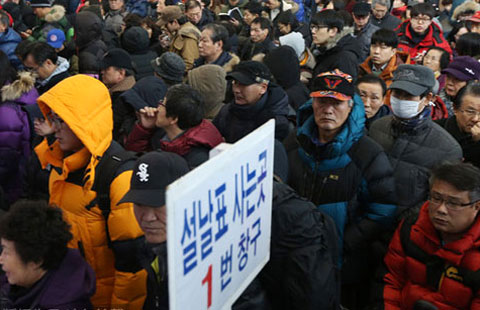800 inmates sent back to jail in 2014
Updated: 2015-01-14 07:58
By Zhang Yan(China Daily USA)
|
||||||||
More than 800 inmates, including many corrupt senior officials who had their sentences commuted illegally, were returned to prison last year, Xinhua News Agency reported on Tuesday.

The 800 inmates sent back to prison include Hu Jianxue, former Party chief of Tai'an city, Shandong province; Shi Baochun, former director of the land development bureau in Yangsuo county, Guangxi Zhuang autonomous region; Ding Zhenwu, former director of the Public Affairs Bureau in Guangzhou, Guangdong province; and Jiang Yanping, former duty manager of the Hunan Provincial Construction Engineering Group, according to the Supreme People's Prosecutorate.
Most of those returned to prison had received illegal commutation of sentences, had been released on parole or were serving their sentences outside prison due to illness, the SPP said.
The move followed an intensified nationwide campaign to combat the illegal reduction of sentences or conditional releases.
"Apart from conducting an active investigation, we have obtained a number of clues from reports from the public and media," said Yuan Qiguo, director of the SPP's prison management bureau.
Figures released by the SPP show that, since March 2014, national prosecutors have collected more than 500 pieces of information involving the illegal reduction of sentences, releases on parole or the serving of sentences out of prison.
They have also investigated many law enforcement officers who allegedly neglected their duties or abused their powers to provide reduced prison terms or conditional releases in exchange for huge bribes, according to the SPP.
Under the Criminal Law, if convicts behave well or are credited with "meritorious achievements", including some inventions and technological innovations, they are eligible for commutation of their sentences.
If inmates are diagnosed with serious illnesses, such as cancer, heart disease or high blood pressure, and are thus considered unable to serve their terms in prison, they can serve the sentences outside to receive medical treatment.
After initial investigations, prison departments submit documents of inmates who make such applications to local superior courts for new judgments. After the courts issue the new rulings, the commutation of sentences or conditional release can take effect.
In January, the CPC Political and Judiciary Commission issued a notice to stipulate strict regulation of the commutation of sentences, conditional releases and sentences served out of prison.
In March, the top prosecuting department launched a nine-month special action to target illegal behavior involved in such releases. The action was taken to fight judicial corruption, especially among senior officials, the wealthy and law enforcement officials, to improve judicial fairness and credibility, according to the SPP.
Yuan said prosecutors will pay attention to investigating prisoners, including corrupt officials, those who committed major economic crimes, Mafia-like gang members, and those involved in violent or terrorist attacks.
Zhou Guangquan, a law professor at Tsinghua University, said, "Some loopholes exist in the operation of commutation of sentences and releases on parole for the judicial authority.
"When holding hearings in such cases, the courts should invite the public and media to participate and supervise the entire trial processes, and the courts should also make the verdicts public online to improve transparency," he said.
Zhangyan1@chinadaily.com.cn

 Best wedding snaps in 2014
Best wedding snaps in 2014
 Fancy sportscars premiere at Detroit auto show
Fancy sportscars premiere at Detroit auto show
 Looking hot in the cold
Looking hot in the cold
 Beijing sees first winter snow amid heavy smog
Beijing sees first winter snow amid heavy smog
 Elderly swimmers see health benefits in freezing water
Elderly swimmers see health benefits in freezing water
 Girl uses nose to run online store
Girl uses nose to run online store
 Pregnant cow winched from well by crane
Pregnant cow winched from well by crane
 Lunar New Year tickets run hot in South Korea
Lunar New Year tickets run hot in South Korea
Most Viewed
Editor's Picks

|

|

|

|

|

|
Today's Top News
China's ban on US chicken could cost millions
Lingerie not focus of Victoria's Secret in China
SelectUSA round 2 gears up
New book on China-US relations published
Li's oil company suspends production in Ohio
Probe into deadly Washington subway smoke may take a year
China, US holding joint drill in South China
China key cog for luxury Lincoln
US Weekly

|

|







